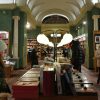By early afternoon, a small memorial of flowers and a can of Pabst had begun to accumulate outside the door of City Lights Books, to commemorate the death of its co-founder Lawrence Ferlinghetti.
And by the evening, a vigil for Ferlinghetti, one of the last living links to the Beat generation, was being held in the adjacent Jack Kerouac Alley, a tiny side street that separates the bookstore – a tourist attraction and official city landmark for decades – from the celebrated Beat hangout Vesuvio Cafe.
With votives, plenty of red wine, and at least one typewriter clacking out fresh verse on the sidewalk, a crowd of more than 100 people gathered to honor Ferlinghetti: published poets, personal friends, and people who simply appreciated sitting in a chair in City Lights’ Poetry Room.
Because Ferlinghetti had reached the advanced age of 101, nearly all those present to remember his spirit were from younger generations. Reciting his own work, a young poet named Scott Lord put it best: “To be a poet at 16 is to be 16. To be a poet at 40 is to be a poet. To be a poet at 101 is to be Lawrence Ferlinghetti.”
Tributes to the late poet poured in throughout the day, as news of his death spread. “I started here 25 years ago, and I was lucky enough to see him every morning when he would come in,” recalled Stacey Lewis, City Lights’ vice-president for publicity, marketing and sales. In recent years, Ferlinghetti’s involvement had mostly become checking mail and writing postcards, she said. “He answered fan mail in a very intentional way. He was signing books up until a few years ago, when he couldn’t physically do it any more.”
Lawrence Ferlinghetti obituary
Read more
Recalling his legacy in the neighborhood, she remembered a line of his that City Lights staff favor. “I’m pretty sure it’s a poem in Coney Island of the Mind: ‘You and me could really exist.’”
Residents of North Beach, the historically bohemian and Italian American neighborhood in San Francisco where Ferlinghetti lived, remembered him as an irascible yet down-to-earth bon vivant into his later years.
Aaron Peskin, the city supervisor who represents the area, tweeted Tuesday that he would adjourn that day’s board of supervisors meeting in Ferlinghetti’s honor. Citing his “rage for justice and profound desire to keep North Beach North Beach”, Peskin told the Guardian that he had already stopped by the tree he planted with the chef Alice Waters and others on the occasion of Ferlinghetti’s centennial in March 2019, and it was thriving.
“You’d see him around the neighborhood, sitting at the back table of Caffe Trieste,” Peskin said, referring to the internationally renowned Italian coffeehouse founded in 1956. “Or driving his funky little red pickup down the street. Everyone knew who he was.”
Ferlinghetti was named San Francisco’s first poet laureate in 1998. Even in those pre-dotcom days, according to a San Francisco Examiner story at the time, he was railing against high rents – which averaged $1,600, or about half of what they are now, even after falling by 10% during Covid – and lamenting that the city had lost its soul.
But Ferlinghetti was as close to a living embodiment of the soul of the city as anyone could claim.
At the euro-chic Cafe Zoetrope near the Transamerica Pyramid, staff remember him as a frequent presence. Lidia Valador, the cafe’s general manager, said he hadn’t been in in a few years, but Cafe Zoetrope had delivered food to him for his 101st and final birthday.
“He always had spaghetti a la carbonara, the malfatti with gnocchi,” she said. “He loved claret from Francis.”
That would be the film-maker and winemaker Francis Ford Coppola, owner of Cafe Zoetrope. On one wall, a bearded Ferlinghetti self-portrait sits near a framed nude female figure doodled over a menu, captioned: “I’m Extra Virgin.”
It’s not Ferlinghetti’s only connection to menus in North Beach restaurants. As Lewis of City Lights recalled: “There was a restaurant called Rose Pistola’s, where, in exchange for a poem, they would let him run up a tab, and he would take us out to lunch.”
At Tuesday night’s vigil, between the semi-clandestine bourbon tippling and the sharing of condolences from Italy, person after person rose to speak.
One woman read from a 1974 anthology her uncle gave her. Another spoke of venturing from the suburbs into San Francisco to be a “baby Beatnik” in the 1960s and later making Ferlinghetti an honorary member of Bay Area Veterans for Peace. (He served in the second world war, at Normandy.)
Robert Carlson, a former librarian from the local public library, told stories of his wife’s reluctance to visit Ferlinghetti’s Big Sur home because of his hard-drinking reputation, and of a holiday card that somehow found its way to his mailbox year after year in spite of the wrong address.
“Even into his 90s, I found him more level-headed than anyone in the neighborhood,” Carlson said.























































Свежие комментарии